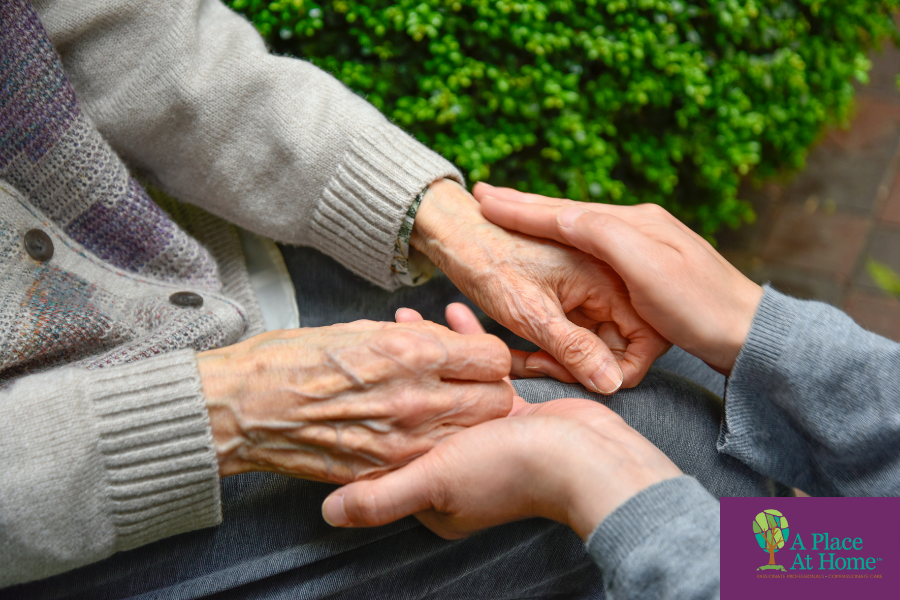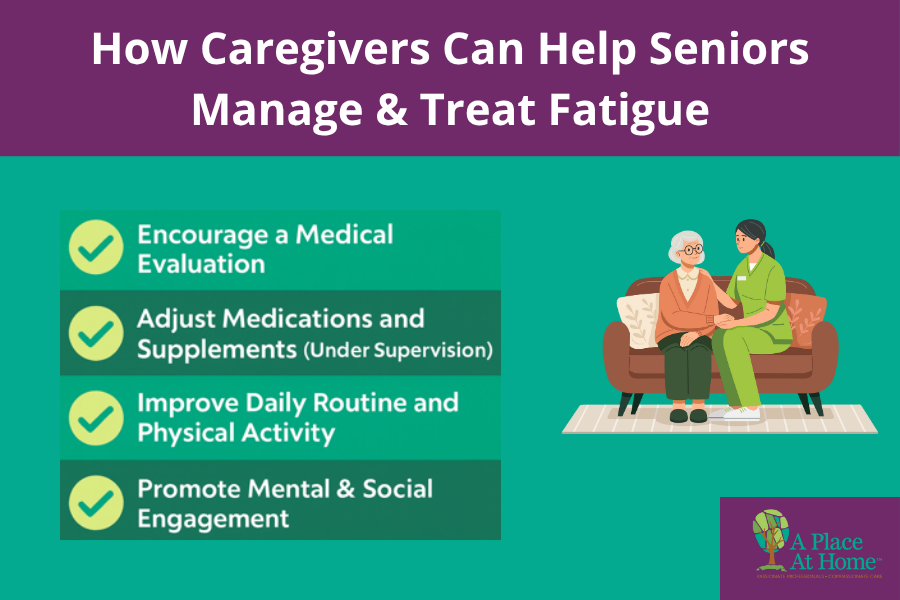Sudden, extreme fatigue in seniors can be alarming for both older adults and their caregivers. Fatigue may result from chronic health conditions, nutritional deficiencies, medication side effects, or mental health challenges.
Caregivers often notice this drop in energy levels before seniors do themselves. Understanding the root causes of fatigue in elderly loved ones is essential to helping them restore energy, maintain independence, and improve quality of life.
What Is Fatigue in Older Adults?
Fatigue in seniors refers to a persistent lack of energy that interferes with daily activities. In older adults, fatigue may present as increased daytime napping, reduced activity levels, or “brain fog” from poor sleep quality. It can be:
| Type / Term | Definition | Key Points |
|---|---|---|
| Chronic Fatigue | Long-lasting tiredness that doesn’t improve with rest. | Often impacts daily functioning and overall quality of life. |
| Acute Fatigue | Temporary exhaustion that improves after adequate rest or recovery. | Usually short-term and linked to a specific cause. |
| Tiredness | A general lack of energy. | May result from physical, mental, or lifestyle factors. |
| Sleepiness | A strong urge or need to sleep. | Often relieved by quality, restorative sleep. |
| Weakness | A lack of physical strength. | It can be related to age, illness, or muscle loss. |
Common Medical Causes of Fatigue in Seniors
1. Chronic Health Conditions
Diseases such as heart disease, diabetes, and thyroid disorders often cause fatigue. Chronic lung issues like Chronic Obstructive Pulmonary Disorder (COPD) can also make seniors feel constantly drained. According to studies, patients with COPD experience 20% more fatigue compared with healthy people.
2. Nutritional Deficiencies
Low iron, also known as anemia, and vitamin B12 deficiency reduce the body’s ability to transport oxygen, leading to exhaustion. Seniors with poor diets or dehydration are at greater risk.
3. Medication Side Effects
Drugs such as beta blockers, antihistamines, and sedatives can cause drowsiness or lethargy. Multiple medications may interact, increasing fatigue.
4. Sleep Disorders
Trouble sleeping is the most obvious cause of fatigue. Seniors who suffer from sleep disorders, like sleep apnea or restless leg syndrome, have a difficult time experiencing restorative sleep. When the urge to urinate interrupts nighttime sleep frequently, it also leads to daytime fatigue.
5. Mental Health Conditions
Depression is often undiagnosed in seniors, but it contributes to fatigue by causing insomnia or excessive sleeping. Anxiety, too, causes fatigue by triggering a persistent and exhausting stress response. Loneliness and isolation are often associated with depression and impact energy levels.

Overlooked Causes of Fatigue in the Elderly
1. Undiagnosed Infections or Illnesses
Conditions like urinary tract infections (UTIs) or low-grade pneumonia can drain energy without obvious symptoms. Caregivers should investigate when the senior becomes suddenly fatigued. Low-grade pneumonia also exacerbates fatigue due to prescribed medications, an inflammatory response in the lungs, or a slow recovery time.
2. Cognitive Decline or Early Dementia
Seniors diagnosed with early dementia or cognitive decline experience less deep sleep, which leaves them feeling the secondary symptom of fatigue. As their condition prevents them from processing stimuli, they may withdraw from once-enjoyable social activities and sleep off their days.
3. Chronic Pain or Inflammation
Constantly fighting off the pain of arthritis or joint inflammation can leave an older person feeling fatigued. Furthermore, living with chronic pain is emotionally exhausting. Autoimmune conditions, like Hashimoto’s thyroiditis, reduce thyroid levels, slow metabolism, and contribute to seniors’ fatigue.
4. Deconditioning & Sedentary Lifestyle
Muscle loss is the undesired consequence of physical inactivity. Sarcopenia, which is age-related loss of muscle mass and strength, makes everyday activities challenging and, therefore, tiring. Failing to move throughout the day similarly causes reduced endurance and the tendency to tire out quickly.
How Caregivers Can Identify Fatigue in Elderly Loved Ones
Look for signs such as:
- Changes in daily routines
- Increased naps or difficulty sleeping at night
- Difficulty concentrating
- Withdrawal from social activities
Caregivers can use fatigue assessment checklists to track patterns and potential causes.
How Caregivers Can Help Seniors Manage and Treat Fatigue

Encourage a Medical Evaluation
Once caregivers recognize fatigue in their elderly care recipients, they should encourage the senior to seek relief by getting a medical evaluation. Questions to ask the doctor include the cause of the fatigue, what tests are recommended, and what treatments might help.
The doctor may conduct bloodwork to arrive at a diagnosis of the condition causing the fatigue, such as anemia, thyroid problems, diabetes, or a urinary tract infection. If the initial tests fail to pinpoint a cause, the senior should ask the physician to investigate further.
Adjust Medications and Supplements (Under Supervision)
At the doctor’s office, the provider will also review medications that produce sedative effects. Drug adjustments might be made to counter the senior’s fatigue. If vitamin deficiencies are responsible for the fatigue, the physician may suggest nutritional supplements to restore health.
Improve Daily Routine and Physical Activity
Seniors who experience fatigue benefit from light daily exercise, exposure to natural sunlight, and avoiding long daytime naps. Walking, stretching, and gentle strength training can boost stamina and improve sleep quality.
Promote Mental & Social Engagement
Staying socially engaged with a caregiver, family member, or friend boosts mental and social health and can relieve the fatigue associated with loneliness or boredom. Companion care provides seniors with meaningful relationships that keep them emotionally and mentally stimulated. Professional counseling is helpful when the caregiver notices the senior withdraws or feels depressed.
Read: What is Companion Care for Seniors? Services and Benefits
When Should You Seek Immediate Help for Excessive Fatigue?
Caregivers are urged to watch for red flags, like sudden fatigue, chest pain, confusion, or an unsteady gait, and seek immediate medical help for their aging care recipient.
Your Partner in Senior Home Care Solutions in Palmetto, FL
The professional caregivers at A Place At Home – Palmetto are dedicated to helping your elderly loved ones age comfortably and safely in their own homes. We provide a variety of non-medical home care services, including fall prevention, meal preparation, personal assistance, and companionship to combat loneliness.
A Place At Home offers personalized, flexible care plans tailored to the unique needs of your loved one, with the ability to adjust as those needs evolve. Schedule a free at-home assessment today and discover how our senior home care services can improve the quality of life for your loved ones in Palmetto, Parrish, Elenton, Bradenton, FL, and the surrounding areas of Manatee County.
FAQs – Sudden Fatigue in Seniors
1. What is the most common cause of sudden fatigue in seniors?
Chronic health conditions like heart disease, diabetes, or thyroid problems are often the main causes of fatigue in seniors. These conditions affect energy levels and stamina over time.
2. Can poor sleep cause extreme tiredness in older adults?
Yes. Sleep apnea, restless leg syndrome, or frequent nighttime bathroom trips can prevent restorative sleep, leading to daytime fatigue.
3. How can I tell if my elderly parent’s fatigue is serious?
If fatigue is sudden, severe, or paired with chest pain, confusion, or dizziness, it’s best to seek professional medical help right away.
4. Can depression make seniors feel more tired?
Depression and anxiety can cause both mental and physical exhaustion, sometimes leading to more sleep or disrupted sleep patterns.
5. What are the three types of fatigue?
The three main types of fatigue are physical, mental, and emotional. Physical fatigue involves reduced strength and endurance, making physical tasks harder. Mental fatigue affects concentration and decision-making, while emotional fatigue results from prolonged stress or emotional strain. These types can occur separately or together, and all are equally important to address.

